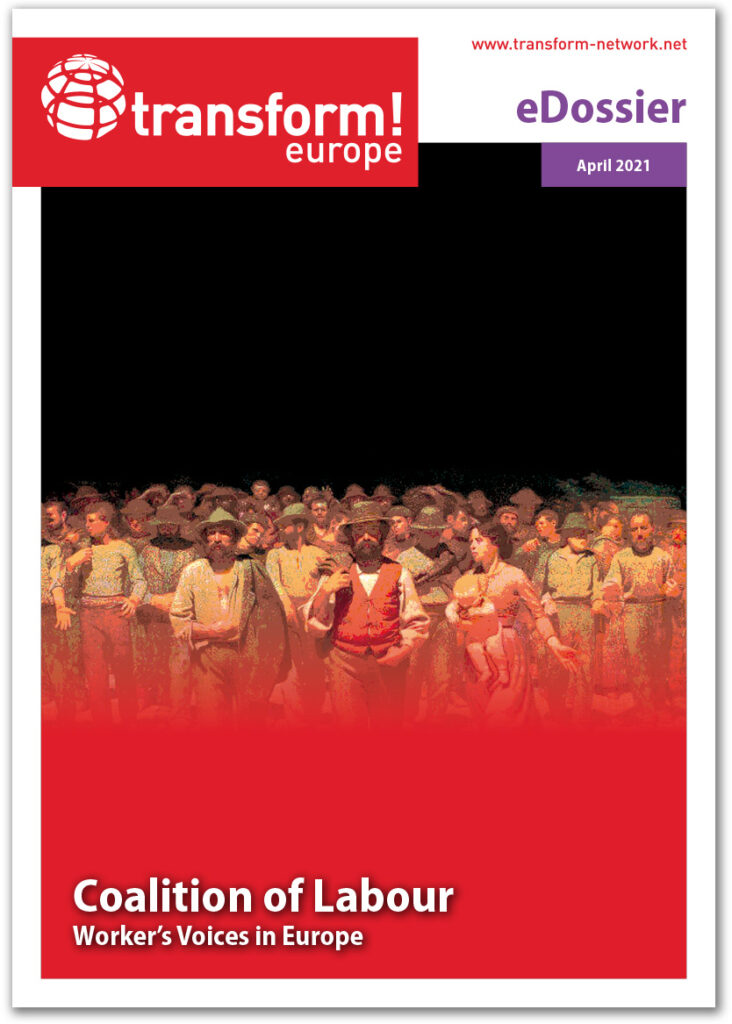In the last decades, the working and living conditions of millions of workers all across Europe have significantly deteriorated. The organisers of this research project not only talked about workers but talked with them, on issues such as working and living conditions, the perceived causes of their situation, and the impact of the pandemic.
In semi-structured interviews carried out between August and November 2020, 46 workers, men and women, from three European countries (France, Germany, and Italy), both in secure and precarious jobs, the following research questions were addressed:
1. How do the respondents perceive themselves and their living conditions in relation to their employment situations?
2. Who do they think is responsible for their conditions?
3. What was the impact of the first wave of the pandemic on them?
4. What are the interviewees’ hopes and desires? Can they imagine a way to fulfil them, and does this entails collective political action?
The interviews exemplify the general deterioration of working conditions in Europe, varying between workers of different countries or areas. Significant contractual instability and the perception of decreasing control over one’s employment situation typified the responses. Job insecurity coupled with low salaries increases the willingness to trade decent employment conditions for more adequate pay. Workers must increasingly work overtime and in multiple jobs as the only viable solution to low wages. Even where, as in Germany, interviewees widely believed that labour markets’ conditions were exceptionally favourable, there were many slash workers among the respondents.
Interviewees’ opinions on the governments’ response to the health and socio-economic crises in the context of the pandemic differ notably by country, German interviewees being the most positive, the French mildly positive, Italians holding the most negative opinions.
However, whilst the of the difference in the way the governments’ responses to the pandemic are seen in these three countries clearly differ, the effect the pandemic has had on working conditions and employment are quite similar. The impact of the first wave of Covid-19 has been more severe among the most vulnerable workers, those in more unstable and exploitative labour relations – often young adults and women. Not all flexible workers, however, reported a worsening of their employment situation. Some interviewees working for platform firms, for example, experienced an increased workload and better pay (due to piece rates). Due to the pandemic’s differentiated gender impact, it has reinforced entrenched disparities between men and women in accessing or re-entering the labour market. The different impact reached beyond the labour market. Also in terms of reproductive work in domestic settings, the pandemic deepened existing gender inequalities.
The objective fragmentation of the labour market has been internalised by most workers interviewed. Only a few referred explicitly to the trade unions as a means of advancing their material conditions. For many, the unions are absent or distant from their day-to-day experience. The idea of the collective interests of all workers was even less discussed. A sense of disconnection prevailed: between the various workplaces, even within the same sector, and between the public sphere and institutional politics, on the one side, and the workplace, on the other.
If unions’ role as a catalyst of solidarity among workers has seemingly faded, mutual help among colleagues is still widely present. However, it is increasingly practised within the individual sphere of personal relationships in the workplace, rather than in the collective sphere of social and political mobilisation – expressing a process of depoliticisation.
The disconnect between workers and unions is changing the way conflicts inside the workplace are expressed. Whilte not suppressed, they increasingly take the form of individual actions or workplace-specific mobilisation. However, the interviewees most passionate about politics and socio-political issues also strongly opposed the idea that improving one’s own employment situation and working conditions is an individual responsibility, and they were well aware of the collective nature of workers’ struggles.
Please find the ePaper on the left/below (mobile version) in ‘Documents’ (English, PDF).
Table of contents
INTRODUCTION, by Roberto Morea
RESEARCH FRAMEWORK AND MAIN ANALYTICAL DIMENSIONS
THE MAIN GOALS AND RESEARCH QUESTIONS
THE CASE OF GERMANY, by Beatriz Casas González
THE CASE OF FRANCE, by Nathan Gaborit
THE CASE OF ITALY, by Edoardo Esposto
THE NEOLIBERAL “REFORM POLICIES” IN FRANCE, GERMANY, ITALY
AND THE ALTERNATIVE NARRATIVES OF LABOUR, by Andrea Allamprese
CONCLUDING REMARKS
RESEARCHERS PROFILES
Thanks for the cooperation to:
Roberto Musacchio
Maria Pia Calemme
Vanna Derosas
Michele Losindaco
